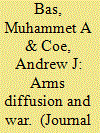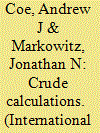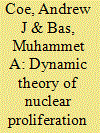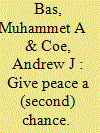|
|
|
Sort Order |
|
|
|
Items / Page
|
|
|
|
|
|
|
| Srl | Item |
| 1 |
ID:
113950


|
|
|
|
|
| Publication |
2012.
|
| Summary/Abstract |
The authors present a model of the relationship between the spread of new military technologies and the occurrence of war. A new technology could shift the balance of power, causing anticipatory war as one side tries to prevent the other from obtaining it. When one side already has it, war is more likely when the shift in power is large, likely, and durable. When neither side has it, war is more likely when the expected shift is asymmetric (e.g., one side is more likely to get it) and when the two sides fear that a war will occur once one of them has it. The authors illustrate the model with historical examples from the spread of firearms (the Musket Wars in precolonial New Zealand) and of nuclear weapons (the end of US nuclear monopoly and the 1967 Six-Day War). A broader implication is that major power competition can unintentionally cause wars elsewhere.
|
|
|
|
|
|
|
|
|
|
|
|
|
|
|
|
| 2 |
ID:
181669


|
|
|
|
|
| Summary/Abstract |
For many centuries, conquest was commonplace, and its attractiveness was central to the character of international politics. Why has it declined? Existing theories cannot explain why powerful countries no longer conquer states with easily extractable wealth. We develop an explanation based on the relationship between a potential conqueror's economic productivity and its ability to profit from conquest. Productivity has opposing effects on conquest's profitability: it raises the opportunity cost of each asset diverted to conquest, but also reduces the quantity of assets required for conquest. The net effect is determined by the composition of investment in innovation. We document that since at least 1950 investment has been predominantly aimed at civilian, not military innovations, so that rising productivity should reduce conquest's net profitability. Using cost analyses of comparable wars, we estimate bounds on the profitability of conquering the oil and gas reserves of the Persian Gulf, a very tempting target, for the United States and Iraq, two potential conquerors of widely differing productivity. Though both mechanisms operate, we find that the net effect of higher productivity is to reduce the profits from conquest. Moreover, this net effect is large enough to render conquest generally unprofitable for contemporary high-productivity states.
|
|
|
|
|
|
|
|
|
|
|
|
|
|
|
|
| 3 |
ID:
149127


|
|
|
|
|
| Summary/Abstract |
We develop a formal model of bargaining between two states where one can invest in a program to develop nuclear weapons and the other imperfectly observes its efforts and progress over time. In the absence of a nonproliferation deal, the observing state watches the former's program, waiting until proliferation seems imminent to attack. Chance elements—when the program will make progress and when the other state will discover this—determine outcomes. Surprise proliferation, crises over the suspected progress of a nuclear program, and possibly “mistaken” preventive wars arise endogenously from these chance elements. Consistent with the model's predictions and contrary to previous studies, the empirical evidence shows that the progress of a nuclear program and intelligence estimates of it explain the character and outcomes of most interactions between a proliferant and a potential preventive attacker. Counterintuitively, policies intended to reduce proliferation by delaying nuclear programs or improving monitoring capabilities may instead encourage it.
|
|
|
|
|
|
|
|
|
|
|
|
|
|
|
|
| 4 |
ID:
161432


|
|
|
|
|
| Summary/Abstract |
We develop a theory of when a deal can be made to stop a state pursuing nuclear weapons, thereby avoiding proliferation or conflict to prevent it. We show a deal can only be made if costly conflict would occur in its absence. Deals are most likely to be made early, when the state's nuclear program is rudimentary, or late, when it is believed to be nearing success, but not in between. A late deal is credibly enforced by more severe punishment than an early one—immediate conflict rather than merely sanctions—and yet must be more generous to the state. If the state anticipates that a late deal would be offered, it will refuse an early deal in favor of continuing its program to secure the more generous late deal. We test and find support for these predictions against the historical record of deal-making over states’ nuclear programs.
|
|
|
|
|
|
|
|
|
|
|
|
|
|
|
|
| 5 |
ID:
062278


|
|
|
| 6 |
ID:
172529


|
|
|
|
|
| Summary/Abstract |
Arming is puzzling for the same reason war is: it produces outcomes that could instead be realized through negotiation, without the costly diversion of resources arming entails. Despite this, arms control is exceedingly rare historically, so that arming is ubiquitous and its costs to humanity are large. We develop and test a theory that explains why arming is so common and its control so rare. The main impediment to arms control is the need for monitoring that renders a state’s arming transparent enough to assure its compliance but not so much as to threaten its security. We present evidence that this trade-off has undermined arms control in three diverse contexts: Iraq’s weapons programs after the Gulf War, great power competition in arms in the interwar period, and superpower military rivalry during the Cold War. These arms races account for almost 40% of all global arming in the past two centuries.
|
|
|
|
|
|
|
|
|
|
|
|
|
|
|
|
|
|
|
|
|